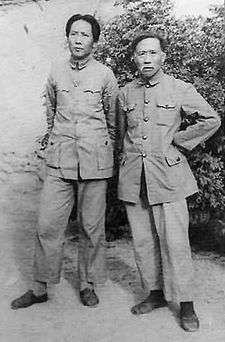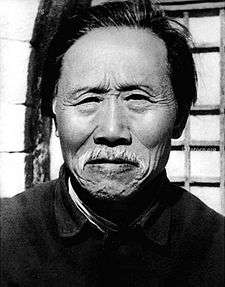Xu Teli
| Xu Teli 徐特立 | |
|---|---|
|
Xu Teli, in Yan'an. | |
| Vice-Minister of Publicity Department of the Communist Party of China | |
|
In office 1949–1949 | |
| Chairman | Mao Zedong |
| Minister of Education of Chinese Soviet Republic | |
|
In office November 1931 – September 1937 | |
| Chairman | Mao Zedong |
| Personal details | |
| Born |
Xu Maoxun February 1, 1877 Changsha County, Changsha, Hunan |
| Died |
November 28, 1968 (aged 91) Beijing |
| Nationality | Chinese |
| Political party | Communist Party of China |
| Spouse(s) | Xiong Licheng |
| Children |
Xu Shouzhen Xu Duben Xu Moqing Xu Houben |
| Alma mater |
University of Paris Moscow Sun Yat-sen University |
| Occupation | Politician, educator |
| Xu Teli | |||||||
| Traditional Chinese | 徐特立 | ||||||
|---|---|---|---|---|---|---|---|
| Simplified Chinese | 徐特立 | ||||||
| |||||||
Xu Teli (February 1, 1877 – November 28, 1968) was a politician of the People's Republic of China. Xu was Mao Zedong's, Cai Hesen's, and Tian Han's teacher.[1] Xu was a member of the 7th Central Committee of the Communist Party of China and the 8th Central Committee of the Communist Party of China.
Biography

Xu was born Xu Maoxun (Chinese: 徐懋恂) in Changsha County, Changsha, Hunan on February 1, 1877, during the Qing Dynasty.[2][3][4] At the age of four, his mother died.[4] In 1885, by age nine, Xu was sent to school.[4]
At age eighteen, Xu set up a private school and taught there.[3] In 1905, Xu attended the imperial examination when he was twenty-eight.[2][3] In 1907, Xu cut his pinky and wrote a letter to the Qing Government.[2][3]
In 1911, Xu took part in the Xinhai Revolution and Hunan Uprising.[2][3]
In 1912, Xu founded the Changsha County Normal School (currently Changsha Normal University).[2][3]
In 1919, Xu studied natural sciences at the University of Paris, he also visited Belgium and Germany.[2][3] In this trip Xu observed modern European societies and cultures for the first time.[2][3] In June 1924, Xu returned to Changsha, he founded the Changsha Women's Normal School and served as the President there.[2][3] At that time, Xu also taught at Hunan First Normal University.
In 1927, during the White Terror, Xu joined the Communist Party of China and took part in the Nanchang Uprising.[2][3][5][6]
In 1928, Xu was sent to Moscow Sun Yat-sen University to study at the expense of the government.[2][3]
In 1930, Xu returned to Jiangxi–Fujian Soviet, he was appointed as the Minister of Education of the Chinese Soviet Republic, a position he held until September 1937.[2][3]
In 1934, Xu took part in the Long March.[2][3]
In 1940, Xu worked as the President of Yan'an Academy of Natural Sciences. When he was in Yan'an, he and Dong Biwu, Lin Boqu, Wu Yuzhang, and Xie Juezai were called the Yan'an Five Seniors (Chinese: 延安五老).
After the founding of the PRC, Xu was appointed as the Vice-Minister of Publicity Department of the Communist Party of China, a few days later, he resigned his post.[2][3][7]
On November 28, 1968, during the Cultural Revolution, Xu died in Beijing, aged 91.[2][3]
Personal life
Xu married Xiong Licheng (Chinese: 熊立诚), they had four children, Xu Shouzhen (Chinese: 徐守珍), Xu Duben (Chinese: 徐笃本), Xu Moqing (Chinese: 徐陌青), and Xu Houben (Chinese: 徐厚本).[4]
Works
- Collected Works of Xu Teli
- Complete Works of Xu Teli
See also
- 7th Central Committee of the Communist Party of China
- 8th Central Committee of the Communist Party of China
- Xu Teli's Former Residence
- Changsha Normal University
- Hunan First Normal University
References
- ↑ 毛泽东为徐特立两次祝寿 (in Chinese). 163.COM. Retrieved 2013.
- 1 2 3 4 5 6 7 8 9 10 11 12 13 14 徐特立:每个共产党员必须坚持实事求是 (in Chinese). Retrieved 2006.
- 1 2 3 4 5 6 7 8 9 10 11 12 13 14 15 徐特立 一生刚烈写传奇 (in Chinese). People. Retrieved 2001.
- 1 2 3 4 徐特立与妻子熊立诚忠贞不渝的爱情 (in Chinese). CPC News. Retrieved 2010.
- ↑ 徐特立游说姜济寰支持南昌起义 坐镇姜公馆掩护及支持南昌起义 (in Chinese). Retrieved 2014.
- ↑ 徐特立在南昌起义中 (in Chinese). Retrieved 2010.
- ↑ 徐特立主动让职位 (in Chinese). Retrieved 2013.
